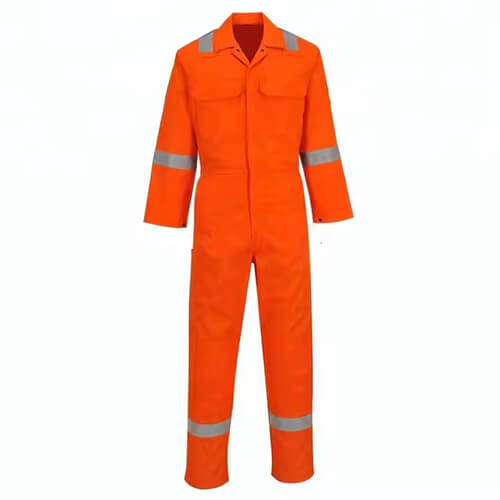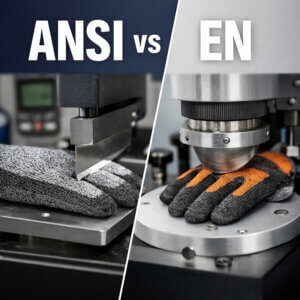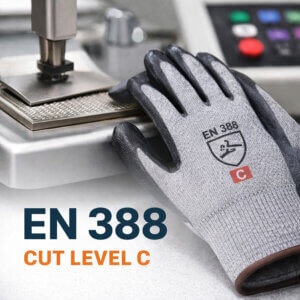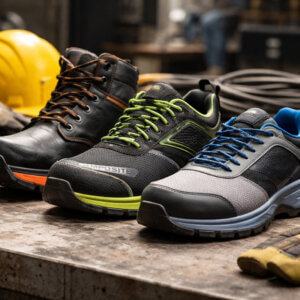Industrial coveralls have evolved beyond basic workwear—they’re engineered systems where material science dictates protection levels. From chemical splashes to electrostatic discharge, the right fabric can mean the difference between hazard and safety. Let’s decode the functional anatomy of coverall fabrics.
I. Core Materials: Performance Under Pressure
-
Tyvek (Flash-Spun Polyethylene)
- Barrier Mastery: Blocks particles as small as 1 micron (dust, asbestos, mold spores), exceeding Type 4/5/6 protection standards .
- Thermal Intelligence: Micro-perforations enable breathability 6× higher than microporous fabrics, reducing heat stress during extended wear .
- Durability: Superior tear/puncture resistance vs. woven fabrics, ideal for asbestos removal or construction .
-
Cotton (Natural Fiber)
- Breathability Champion: Optimal for hot climates or high-exertion tasks (e.g., welding support) .
- FR Adaptability: When chemically treated, achieves flame resistance (ISO 11612 compliant) .
- Limitation: Poor moisture resistance; degrades rapidly in oily/wet environments.
-
Polyester (Synthetic Powerhouse)
- Chemical/Moisture Shield: Repels oils, acids, and water; dries 3× faster than cotton .
- Abrasion Resilience: Withstands friction in industrial maintenance or machinery operation .
- Limitation: Low breathability risks heat accumulation.
-
Cotton-Polyester Blends (Hybrid Solutions)
- Balanced Performance: Cotton’s comfort + polyester’s durability .
- Cost Efficiency: 20-30% cheaper than pure specialty fabrics (e.g., Tyvek) .
- Versatility: Tailorable for FR/static-dissipative finishes.
II. Specialized Functional Fabrics
| Hazard | Solution Fabric | Key Properties |
|---|---|---|
| Fire/Heat | Aramid Blends (e.g., Nomex) | Self-extinguishing; ISO 11612 certified |
| Static Electricity | Carbon-Fiber Embedded Polyester | Surface resistance ≤10⁹Ω (EN 1149-5) |
| Chemical Splash | Microporous Polypropylene Laminate | ASTM F1670/F1671 blood-pathogen barrier |
| Extreme Cold | PCM-Integrated Liners | Phase-change materials buffer -30°C to 10°C |
III. Sustainable Innovations
- Recycled PET Fabrics: 97% recycled polyester, GRS (Global Recycled Standard) certified .
- Tencel (Lyocell): Wood pulp-based, closed-loop production; biodegradable + hypoallergenic .
- Eco-Finishes: PFOA-free water repellents; Bluesign-approved dyes .
Case Study: Ford Motors’ switch to 65% recycled polyester coveralls cut annual waste by 12 tons .
IV. How to Choose: Material vs. Risk
Consider these critical factors:
- Threat Profile:
- Chemical exposure? → Polyester laminates
- Metal sparks? → FR-treated cotton
- Fine particulates? → Tyvek
- Compliance Labels:
- Flame resistance: ISO 11611/11612
- Electrostatics: EN 1149 or ANSI/ESD S20.20
- Biohazards: ISO 16604
- Ergonomics:
- 4-way stretch panels (e.g., spandex blends) enhance mobility in confined spaces.
Future-Forward: Smart Coveralls
- Sensors: Woven pH/thermal sensors alert wearers to chemical breaches or heat stress.
- Self-Decontaminating Fabrics: TiO₂ nanocoatings break down toxins under UV light .
- AI-Driven Fit: 3D body scans customize pressure mapping for fatigue reduction .
Material Comparison Cheat Sheet
| Material | Best For | Avoid In | Lifespan |
|---|---|---|---|
| Tyvek | Hazardous particulates | Fire risk | 50+ wears |
| Cotton | High-heat settings | Wet/oily tasks | 30-40 wears |
| Polyester | Chemical zones | Arc flash areas | 70+ wears |
| 65/35 Poly-Cotton | Multi-hazard work | Extreme conditions | 45-55 wears |
Expert Tip: For electrical work, prioritize carbon-threaded coveralls with wrist-grounding terminals—static discharge drops from 5kV to <0.1kV .
Coverall materials are your silent guardians. Whether blocking carcinogenic dust or enabling agile movement, fabric technology transforms protection from passive to proactive. As sustainability and intelligence redefine textiles, tomorrow’s coveralls won’t just protect—they’ll communicate, adapt, and regenerate.








